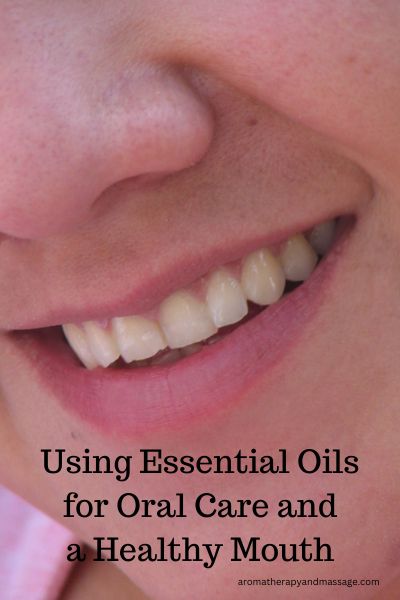- Home
- Essential Oils for Body Care
- Oral Care
As an affiliate with Bookshop, Amazon, and other programs, I may earn revenue from qualifying purchases through affiliate links. This does not affect the price you pay. Privacy Policy / Disclosures. This site is for educational purposes only.
Search this site:
Using Essential Oils for Oral Care
Commonly recommended essential oils for oral care include clove, myrrh, peppermint, spearmint, tea tree, and thyme. You can use these and other essential oils for mouth health in a variety of ways:

- Homemade Toothpaste
- Homemade Mouthwash
- Bad Breath
- Toothache
- Bleeding Gums
- Gingivitis
- Dental Abscess
- Mouth Ulcers or Sores
- Oil Pulling
The information here is an introduction. For more about essential oils for oral care, see the book Essential Oils for Dental Health by a holistic dentist and aromatherapy practitioner. Always consult a dentist as appropriate.
Essential Oils for Toothpaste
If you find peppermint too strong, you can substitute with spearmint.
Homemade Natural Toothpaste Recipe
- 1 tablespoon melted coconut oil
- 1 tablespoon baking soda
- 1 drop peppermint essential oil
- 1 drop tea tree essential oil
Blend the coconut oil and baking soda in a glass jar. Stir in the essential oils. Let set.
To use: Dab a little of the mixture on your toothbrush.
Tooth Powder
Makes about 1 cup.
- 1/2 cup fine sea salt
- 1/2 cup baking soda
- 8 drops peppermint essential oil
- 5 drops lemon essential oil
- 2 drops myrrh essential oil
- In a small glass bowl, combine sea salt and baking soda.
- In another glass bowl combine essential oils.
- Very slowly, one drop of the time, add essential oil mixture to powder mixture, stirring constantly to prevent clumping.
- Store powder in airtight container for up to six months.
To use: Place 1/4 teaspoon tooth powder in your palm. Wet toothbrush and dip it into powder. Brush teeth. Rinse and spit out. Rinse again.
Source: The Complete Aromatherapy & Essential Oils Handbook for Everyday Wellness
Essential Oils for Mouthwash
Essential Oil Mouthwash Recipe
Makes about 8 ounces.
- 1 teaspoon raw honey
- 2 drops spearmint essential oil
- 2 drops peppermint essential oil
- 1 drop anise essential oil
- 1 cup distilled water or sage herbal tea
- Place honey in glass cup. Blend in the essential oils.
- Add a small amount of the water or tea. Stir until honey is completely dissolved.
- Stir in the remaining water or tea. Bottle and label.
To use: Shake well. Swish a small amount of the mixture in your mouth for 30 to 60 seconds. Spit out.
Source: Aromatherapy, A Holistic Guide to Natural Healing With Essential Oils
Mouthwash with Essential Oils
Makes about 4 ounces.
- 1/3 cup apple cider vinegar
- 4 teaspoons tea tree hydrosol (or brandy)
- 1 teaspoon vegetable glycerin
- 10 drops lemon essential oil
- 10 drops peppermint essential oil
- 5 drops myrrh essential oil
- Combine all ingredients in a sterilized resealable 4-ounce glass jar. Seal and shake well.
- Set jar aside in a cool, dark place for four days, shaking occasionally.
- Strain the mixture through a fine-mesh sieve into another sterilized resealable jar. Store in dark place for up to 12 months.
To use: In a glass, combine 1 teaspoon mouthwash and 1/4 cup warm weather. Use to rinse your mouth thoroughly, and then spit out the mixture. Do not swallow.
Source: The Complete Aromatherapy & Essential Oils Handbook for Everyday Wellness
All-Purpose Mouth Rinse
- 20 drops tea tree oil (Melaleuca alternifolia)
- 8 drops myrrh essential oil
- 1 ounce (2 tablespoons) echinacea tincture
Mix the ingredients in a dark bottle.
To use: Shake the bottle well. Put 1/4 teaspoon of the blend in 1/8 cup water. Swish in your mouth for at least one minute. Do not swallow.
Source: Essential Oils & Aromatherapy for Dummies
Essential Oils for Bad Breath
Any of the mouthwashes will probably help reduce bad breath. For a simple rinse, The Complete Essential Oils Sourcebook suggests cardamom, coriander, clove, fennel, ginger, tea tree, or thyme essential oil. Add 4 to 5 drops to a glass of lukewarm water. Stir well. Wash out your mouth and gargle twice a day. Do not swallow.
Other potentially helpful essential oils include bergamot, lavender, and tarragon.
Essential Oils for Toothache
Clove essential oil is the most recommended essential oil for a toothache. Dilute the essential oil with an edible oil (olive, coconut, etc.) and apply it directly to the tooth and surrounding gum several times a day.
Other oils suggested by Therapeutic Blending With Essential Oil include peppermint, tea tree, blue tansy, roman chamomile, and myrrh.
Essential Oils for Oral Care of Bleeding Gums
Bleeding gums are often a symptom of gingivitis, periodontitis, and other gum diseases. However, bleeding can also indicate problems such as diabetes, hormone fluctuations, tooth grinding, and vitamin deficiencies. Consult a dentist or other healthcare professional.
For bleeding gums, the Essential Oils Desk Reference recommends clove, geranium, cinnamon, peppermint, mountain savory, or myrrh essential oil. Dilute one drop essential oil in a few drops of carrier oil. Apply this blend to gums 2 to 3 times a day.
Mouth Rinse for Bleeding Gums
- 1 cup sage herbal tea
- 1 tablespoon distilled witch hazel
- 1 teaspoon raw honey
- 2 to 3 drops tincture of myrrh
- 1 drop lemon essential oil
- 1 drop eucalyptus essential oil
- Add the witch hazel to the cup of sage tea.
- Combine the honey, myrrh tincture, and essential oils. Stir the blend into the cup of tea. Bottle and label
To use: After brushing your teeth, swish a small amount of rinse in your mouth. Spit out. Repeat several times a day.
Source: Aromatherapy, A Holistic Guide to Natural Healing With Essential Oils
Essential Oils for Gingivitis
Gingivitis Mouth Rinse
- 3 drops thyme essential oil
- 3 drops mandarin essential oil
- 3 drops myrrh essential oil
- 1 drop lemon essential oil
- 3 tablespoons vodka (or substitute echinacea tincture)
- 6 tablespoons + 2 teaspoons warm water
After cleaning your teeth, rinse your mouth with 1 to 2 tablespoons of the blend. Do not swallow.
Source: Massage & Aromatherapy: Simple Techniques at Home
Gingivitis Mouthwash
- 1/4 cup sherry
- 8 teaspoons brandy
- 1 teaspoon glycerin
- 6 drops thyme linalol essential oil
- 6 drops peppermint essential oil
- 4 drops myrrh essential oil
- 2 drops rose essential oil and/or 2 teaspoons rose hydrosol
- In a 4-ounce glass jar combine all ingredients. Mix thoroughly.
- Using a coffee filter to strain mixture into a dark glass bottle with a stopper.
To use: Add 1 teaspoon mouthwash to 1/2 cup warm water and mix well. Rinse mouth several times and spit out the mixture (do not swallow). Repeat several times a day as needed.
Source: The Complete Aromatherapy & Essential Oils Handbook for Everyday Wellness
Dental Abcess
Caution: Abscesses can be dangerous. See a dentist as appropriate.
Blend the following oils:
- 3 drops lavender essential oil
- 2 drops tea tree essential oil
- 1 teaspoon olive or other edible oil
Apply a little to the abscess two or three times a day.
Source: The Complete Book of Aromatherapy and Essential Oils
Other potentially helpful essential oils include clove, thyme, roman or german chamomile, peppermint, myrrh, or cinnamon leaf, according to The Complete Essential Oils Sourcebook.
Essential Oils for Mouth Ulcers or Sores
Mouth ulcers are tiny blisters that burst to form a sore in the mouth. The Complete Essential Oils Sourcebook recommends cypress, myrrh, and tea tree essential oils.
Combine a drop of essential oil in a few drops carrier oil. Apply to sore 2 or 3 times a day.
Other oils suggested by Therapeutic Blending With Essential Oil are bergamot, clove, fennel, geranium, peppermint, and thyme.
Essential Oils for Oil Pulling
If you use oil pulling as part of your dental care routine, you can add essential oils to the oil. Here are two options:
- 3 drops myrrh essential oil
- 1 drop peppermint essential oil
- 1 tablespoon carrier oil
or
- 1 drop lavender essential oil
- 1 drop tea tree essential oil
- 1 drop peppermint essential oil
- 1 tablespoon carrier oil
Source: Essential Oils For Healing
Photo Credit: Eperales/Flickr/CC BY 2.0



